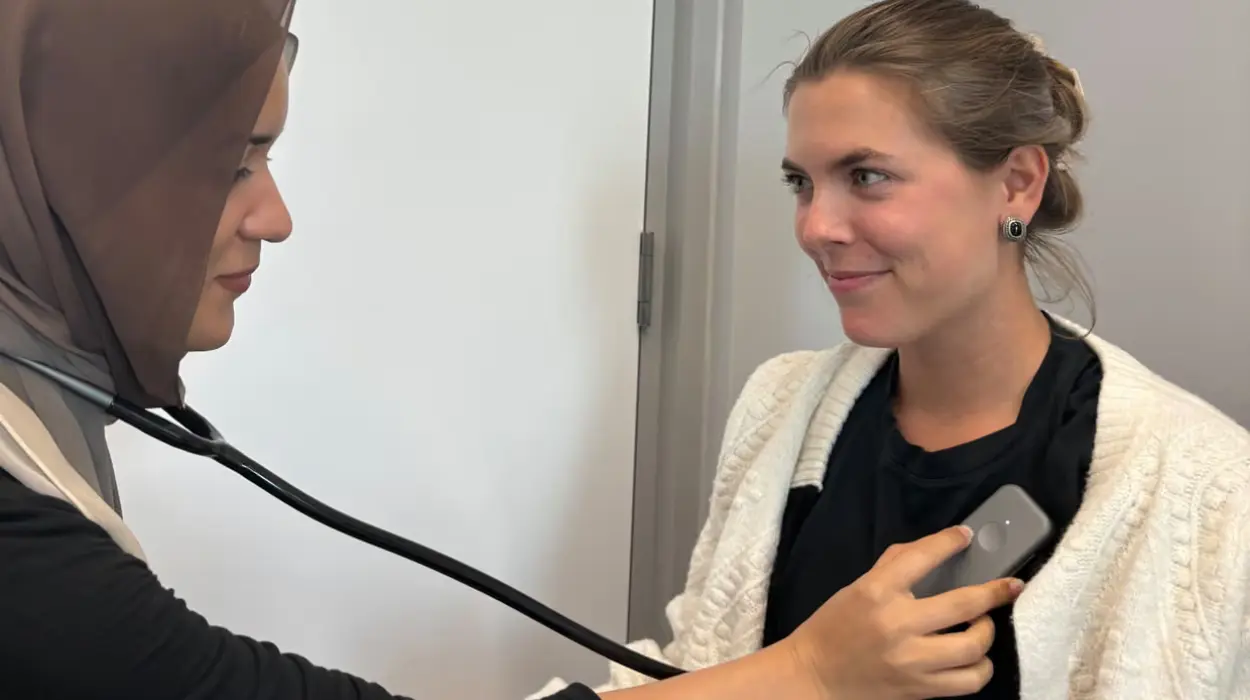London (Parliament Politics Magazine) – Imperial College London doctors created an AI stethoscope that diagnoses heart failure, valve disease, and irregular rhythms in 15 seconds.
As reported by The Guardian, doctors have developed an AI-powered stethoscope capable of detecting three heart conditions in just 15 seconds.
Since its invention in 1816, the traditional stethoscope has been an essential tool for doctors. It has allowed them to listen to the body’s hidden sounds for over two centuries.
AI stethoscope to diagnose heart conditions in seconds
Researchers at Imperial College and Imperial College Healthcare have created a new AI stethoscope. It tracks subtle variations in heartbeat, undetectable to the human ear, and can take a rapid ECG simultaneously.
At the European Society of Cardiology annual meeting, doctors reviewed the new stethoscope.
Finding heart failure, valve problems, and irregular heartbeats early is very important. It helps doctors spot patients who need medicine quickly and stop them from getting seriously sick.
In the UK, 12,000 patients from 200 GP practices were examined using an AI stethoscope, focusing on signs such as breathlessness or tiredness.
Patients assessed with the new AI technology doubled their chances of having heart failure detected compared with those who were not examined.
The AI stethoscope helped identify atrial fibrillation three times more often, an abnormal heart rhythm that increases stroke risk. It also diagnosed heart valve disease almost twice as frequently, affecting proper valve function.
The device was developed by California-based Eko Health and is roughly the size of a playing card. It records an ECG from the patient’s chest while its microphone captures the sound of blood moving through the heart.
The data is sent to the cloud, a secure online storage system, where AI algorithms analyse it to spot heart problems that might be missed by doctors.
The analysis reveals if a patient is at risk for any of the three heart conditions, and the result is sent to their smartphone.
Experts warn the AI stethoscope carries risks. It may incorrectly tell someone they have a heart condition. They say it should only be used for patients with suspected heart problems, avoiding routine checks in healthy people.
What did Dr Patrik Bächtiger say about the new AI stethoscope?
Dr Patrik Bächtiger, of Imperial College London’s National Heart and Lung Institute and Imperial College Healthcare NHS trust, stated,
“The design of the stethoscope has been unchanged for 200 years – until now.”
He added,
“So it is incredible that a smart stethoscope can be used for a 15-second examination, and then AI can quickly deliver a test result indicating whether someone has heart failure, atrial fibrillation or heart valve disease.”
What did Dr Mihir Kelshiker say about AI stethoscopes detecting heart problems early?
Dr Mihir Kelshiker from Imperial College stated,
“Most people with heart failure are only diagnosed when they arrive in A&E seriously ill.”
He added,
“This trial shows that AI-enabled stethoscopes could change that – giving GPs a quick, simple tool to spot problems earlier, so patients can get the right treatment sooner.”
Dr Sonya Babu-Narayan’s views on early heart diagnosis
Dr Sonya Babu-Narayan, clinical director of the British Heart Foundation, commented on the study, saying, “Given an earlier diagnosis, people can access the treatment they need to help them live well for longer.”
The research was partly funded by the foundation and the National Institute for Health and Care Research.
What did Prof Mike Lewis say about the AI stethoscope’s impact on patients?
Prof Mike Lewis, the NIHR scientific director for innovation, added,
“This tool could be a real game-changer for patients, bringing innovation directly into the hands of GPs. The AI stethoscope gives local clinicians the ability to spot problems earlier, diagnose patients in the community, and address some of the big killers in society.”
Wes Streeting’s views on using AI to improve NHS care
Health Secretary Wes Streeting said,
“We’re using cutting-edge technology to build an NHS fit for the future and tackle the hospital backlogs that have left too many people waiting too long.”
He added,
“Doctors will spend less time on paperwork and more time with patients, getting people home to their families faster and freeing up beds for those who need them most.”
What did Peter Kyle say about AI transforming public services?
The technology secretary, Peter Kyle, stated,
“This is exactly the kind of change we need, AI being used to give doctors, probation officers and other key workers more time to focus on delivering better outcomes and speeding up vital services.”
He said,
“This government inherited a public sector decimated by years of underinvestment and is crying out for reform. These AI exemplars show the best ways in which we’re using tech to build a smarter, more efficient state.”
Mr Kyle added,
“When we get this right across government, we’re talking about unlocking £45bn in productivity gains, delivering our plan for change and investing in growth, not bureaucracy.”
Key facts about heart patients in the UK
Over 7.6 million people in the UK live with heart disease, including 4 million men and 3.6 million women. Women are often underdiagnosed and undertreated, receiving fewer timely tests and treatments than men.
Heart health declines with age, with poor glucose control affecting nearly half of men and women. Menopause further increases cardiovascular risk for women, especially after age 50.


